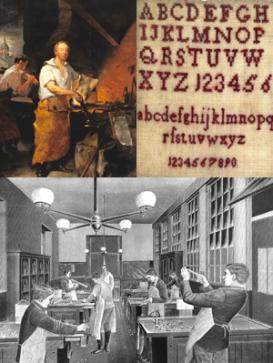Learning a trade charts a path to adulthood, a form of planning for a key element in a young person's eventual maturity, thus an act of imagination about the future world the grown child will inhabit. This project explores the imagined adulthoods of one industrial city by collecting and analyzing options in technical education across a "long" nineteenth century. As such, it maps various kinds of technological knowledge onto social and cultural visions, taking the case of Philadelphia in the British colony and then U.S. state of Pennsylvania. Planning paths to adulthood offers a lens for analyzing the technosocial terrain of industrialization, capitalism, and citizenship.
In this project, technical education affords a locus for exploring the enmeshed material processes and cultural meanings of technological knowledge in an industrializing city. Simply stated, technical education, from the apprenticeship contracts of the early U.S. Republic to the "vo-tech" (vocational-technical) high school of the early twentieth century, prepared children and youth for the urban industrial order as their elders understood and imagined it. And yet a focus on technological knowledge opens vistas on the complexity of these projects in what may be seen as political economies and technosocial regimes of child-rearing: many "plannings" collaborate, negotiate, and collide on this terrain. While each school, program, or institution was shaped initially by the modern apparatus of "planning" as clarified structure for future improvement, historically we can also read the combination of prescriptions and daily practices and negotiations in terms of the broader conception of planning as "making things work"—in the eyes of founders, legislators, and managers; in the eyes of parents and guardians and teachers; in the eyes of the young people themselves.

